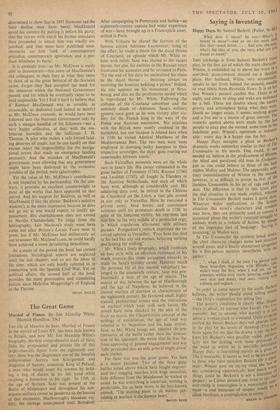The Great Game
Marshal of France. By Jon Manchip White. (Hamish Hamilton, 35s.)
THE life of Maurice de Saxe, Marshal of France in the service of Louis XV, has been little known in Britain, and now Mr. Jon Manchip White's biography, the first comprehensive study of Saxe, links the professional and private life of this larger-than-life figure from the eighteenth cen- tury. Saxe was the illegitimate son of the Swedish noblewoman Aurora von Konigsmark . and Augustus of Saxony, sometime King of Poland, a man who would court his women by hold- ing a bag of ducats in his left hand while crushing a horseshoe in his right. In 1709, at the age of thirteen, Saxe was present at the Battle of Malplaquet and throughout his sub- sequent military career he pondered on the lessons of that encounter, Marlborough's bloodiest vie- fory, the carnage unsurpassed until Borodino. After campaigning in Pomerania and Serbia—no eighteenth-century captain had wider experience of war—Saxe, brought up in a Francophile court, settled in Paris.
With Voltaire he shared the favours of the famous actress Adrienne Lecouvreur; tiring of the affair, he made a throw for the ducal throne of Courland, an episode which Mr. White re- lates with relish. Saxe was elected to the vacant throne, but alas, his enemies in the Russian court frustrated his accession and he retreated to Paris. `To the end of his days he maintained his claim to the ducal throne . . . insisting always on receiving the honours befitting a prince.' Indeed, his title appears on his monument at Stras- bourg, and also on the posthumous medal which is reproduced by Mr. White. Following the collapse of the •Courland adventure and the untimely death of Adrienne, Saxe's military renown soon grew as he won victory after vic- tory for the French king in the wars of the Polish and Austrian succession. His relations with the British were mostly confined to the battlefield, but one incident is related here when in 1740 he visited Admiral Matthews of the Mediterranean fleet. The two men were 'soon employed in downing bulky bumpers to their respective sovereigns, the ships' guns roaring out cannonades between toasts.'
Such Falstaflian moments were on the whole rare in Saxe's life. His career culminated in the great battles of Fontenoy (1745), Rocoux (1746) and Leufeldt (1747), all fought in Flanders or the Austrian Netherlands, and each of which Saxe won, although at considerable cost. His soldiering days over, he retired to the Château de Chambord on the Loire, a vast pile second in size only to Versailles. Here he exercised a private army, bred horses and entertained actresses until his premature death in 1750. In spite of his fabulous virility, his exertions laid him lOw 'in the very middle of a protracted orgy, in which copulation alternated with military parades.' Pompadour's remark expressed the re- ceived opinion at Versailles: 'Poor Saxe has died in his bed like any old woman, believing nothing and hoping for nothing.'
Mr. White's lively biography, which combines an easy style with an effortless command of his many sources, has some perceptive remarks to make on Saxe's military career. However much the personal life of this martial voluptuary be- longed to the nineteenth century, Saxe was pro- fessionally a man of the age of reason. I he master of war between the age of Marlborough and the age of Napoleon, he believed in the limited warfare of attrition so characteristic of the eighteenth century. He favoured small, highly trained, professional armies and the restrictions on warfare which went with such forces. He would have been shocked by the idea of the levee en masse, the Clausewitzian concept of the strategy of annihilation, the age of total war ushered in by NapoleOn and his huge armies. Saxe, as Mr. White brings out, enjoyed the pre- liminaries of the battle 'rather than the destruc- tion of his opponent. He wrote that he was 'far from approving of general engagements' and was `fully persuaded that an able general might avoid' such clashes.
For Saxe war was the great game: Yet here is a major paradox. Two of the three great battles noted above which Saxe fought degener- ated into slogging matches with huge casualties, little different from the Malplaquet he wished to avoid. In war everything is uncertain, nothing is predictable. for as Saxe wrote in his best-known remark, 'The starting point in all matters per- taining to warfare is the human heart.'
DAVID REES


































 Previous page
Previous page